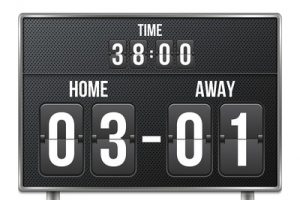 The away goals rule is one of those Marmite discussion points in football.
The away goals rule is one of those Marmite discussion points in football.
Some like the fact that vising teams are rewarded for their endeavour while on their travels, but others can’t see the wisdom in a single goal carrying so much influence in games.
The debate has now been rendered meaningless, however, with the news that the away goals rule has been abolished by UEFA.
That means that, as of next season (2021/22), neither the Champions League or the Europa League will be subject to the rule.
If games are level on aggregate after two legs, the contest will go into 30 minutes of extra time and then a penalty shootout if required.
The UEFA Executive Committee signed off on the rule change, and their president Aleksandr Ceferin reflected on a unique law that has been part of continental football since 1965.
“The impact of the rule now runs counter to its original purpose as, in fact, it now dissuades home teams – especially in first legs – from attacking, because they fear conceding a goal that would give their opponents a crucial advantage,” he said.
“Taking into consideration the consistency across Europe in terms of styles of play, and many different factors which have led to a decline in home advantage, the UEFA Executive Committee has taken the correct decision in adopting the view that it is no longer appropriate for an away goal to carry more weight than one scored at home.”
Ceferin also confirmed that the abolition of the away goals rule had been discussed for a number of years, with a number of stakeholders within the game questioning its fairness amid an ongoing trend for lessened home advantage. The fact that many games have been played behind closed doors or with limited capacity crowds lately, has also hastened the end of one of football’s most debated laws.
What is the Away Goals Rule?

Once upon a time, football was beset with a travel sickness problem.
Teams playing at home had a significant advantage, with the visiting side often sitting back and trying to avoid defeat rather than actively attempting to win – this pattern was particularly prevalent in two-legged ties in Europe.
To try and encourage the away team to attack more, UEFA introduced the away goals rule in time for the Cup Winners’ Cup of 1965-66.
The idea is that goals scored by the away team essentially count double when a two-legged fixture ends in a draw. In essence, the side that scores the most away goals over the 180 minutes is declared the winner.
The first team in history to benefit from the away goals ruling was Budapest Honved, who overcame Dukla Prague in the second round of the Cup Winners’ Cup. They won the first leg 3-2 away from home, before being downed on home soil 1-2.
It is not yet known if FIFA will follow UEFA’s lead, and so – for now at least – qualification play-off matches for the World Cup or European Championship will still be contested with the away goals rule active.
